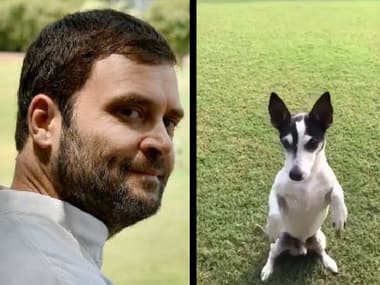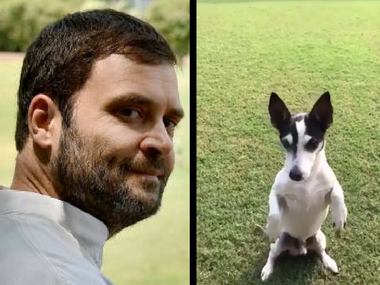Rahul Gandhi’s pet Pidi seems to have taken Twitter – oops, the nation – by storm. If injecting new life into an organisation is the job of a leader, the Congress vice-president has succeeded remarkably. In so far as making his critics and opponents take notice, Rahul should also get more than just passing marks. From plain mocking and ridiculing, the ruling party is feeling the need to refute him from being simply dismissive. For jokes shared on WhatsApp are indices of political rating, and he is clearly winning at the moment. [caption id=“attachment_4183221” align=“alignleft” width=“380”]  File image of Congress vice-president Rahul Gandhi and his dog Pidi. Source: Twitter[/caption] It is not for us to discount the significance of these indicators, in the absence of any hard data to back. But often, anecdotal evidence proves more accurate than rigorous research and opinion polls. America learnt it with Donald Trump and Britain with the Brexit vote. None of the opinion polls in 2014 had predicted a landslide victory for Narendra Modi and it is often said, that if she didn’t believe the Intelligence reports, Indira Gandhi would never have called for elections in 1977. But, it is a trifle scary that the intelligentsia — political pundits, academics, intellectuals and doyens of the industry – should be carried away by superficial analyses and casual conversations in the cocktail circuit. It has been widely alleged that Modi won in 2014 by administering a heady concoction of rhetoric and “jumla” on the country. Irrespective of the merit of such an indictment, one cannot deny there is palpable disappointment among the well-to-do sections, the middle and affluent classes of society. This sense of being jilted is even more apparent among traders, businessmen and industrialists. They had probably pegged expectations even higher from a Right-of-Centre government and a Gujarati prime minister, who has been known to be business and industry-friendly. They took it almost as a betrayal.
If demonetisation felt like backstabbing, GST was the proverbial last nail in the coffin. On the rebound, they seem to be swinging from TINA-Modi (there is no alternative to Modi) to AOBM (anyone but Modi). That is why, perhaps, Pidi drew loud cheers from the stands.
But in reacting emotionally, they run the risk of the same malady of erring on the side of over-enthusiasm, as they feel in hindsight about supporting Modi in 2014 or, perhaps, Rajiv Gandhi 33 years ago. The need of the hour, therefore, is a more balanced judgement. Sadly, in a world of polarised polity, there are no shades of grey in public discourse anymore. Everything is binary now. Without being foolhardy in trying to defend demonetisation, let us talk of GST. Even assuming that GST in its current form is deeply flawed, can any expert honestly assert that the implementation of such a mega fiscal reform could have been implemented without significant disruptions? Granted demonetisation was a bolt from the blue and the industry did not have the opportunity to proactively engage with the government. But, what was the contribution of the private sector in GST formulation other than lobbying for lower rates in their respective categories? Even now, one does not hear of any comprehensive proposals from the private sector for restructuring GST, only requests for specific relief on rates or exemptions to certain products. At the risk of sounding flippant, this may be called the “Me too” moment of the industry. While everyone complains in private, no one is willing to stand up and be counted. While politicians can be excused for going after the prime ministers and the government, catching them on the wrong foot, the industry is expected to play a more constructive part. After all, GST is a reform that a country like India needed to create a unified market dissolving economic borders between states.
Going forward, India will require more radical reforms. And, those will not be easy ones to pluck – in the areas of land, labour, and retail etc.
These will need a tremendous political will, consensus and bipartisanship. In that, the private sector will have to play a responsible role in its own long-term interest. It cannot afford to lose nerve easily and throw the baby out with the bathwater. The industry will have to show greater maturity and use its own clout to get political opponents to sup together for the sake of the country. Modi has, indeed, pointed out that GST was a consensus reform, in which every political party and state government had a say. But, that does not mean he can shirk responsibility. As the leader, the buck stops with him. But, in fairness, others cannot wash off their hands from it either. Whatever may have been his stand on GST earlier, as prime minister, he staked his political capital for its safe passage. Another leader in his place may not have had either the mandate or will to take such a risk. We can then be left eating crumbs like Pidi instead of a full meal for which the nation has waited for far too long.


)




